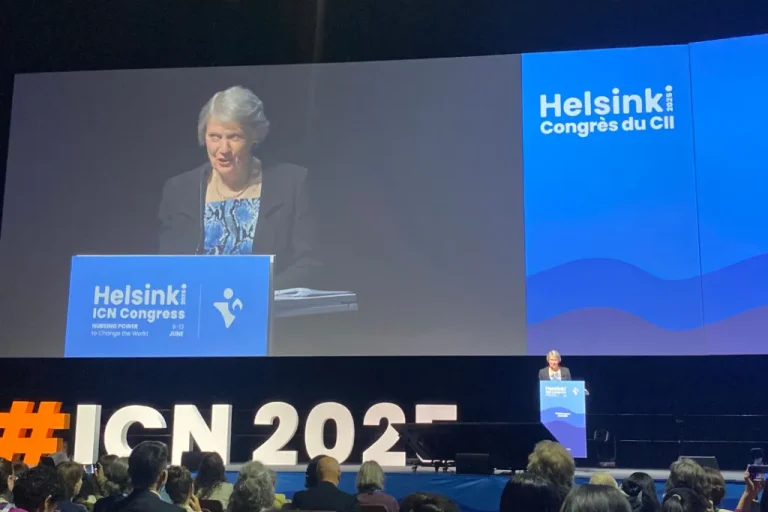Nurses must be involved in pandemic preparedness in all countries across the world, a global nursing conference has heard.
Helen Clark, former New Zealand prime minister and former co-chair of the World Health Organization (WHO) Independent Panel for Pandemic Preparedness and Response, and International Council of Nurses (ICN) president Dr Pamela Cipriano, discussed the topic at ICN Congress 2025.
“Had nurses been consulted at the early stages [of the pandemic]… the outcomes could have been very different”
Helen Clark
The event is taking place this week in Helsinki, Finland and is hosting more than 7,000 nursing representatives from more than 140 countries across the world.
Ms Clark delivered a speech at the event on the topic of nursing leadership. During this speech, she spoke about the leadership role nurses should have – but historically have not had – in health planning.
She said nurses felt “excluded” from preparations before the Covid-19 pandemic: “Nursing had professional knowledge and hands-on experience, which should have been huge assets to the response. “
The former stateswoman, who led New Zealand between 1999 to 2008, said that lessons from that pandemic had not yet been learned.
“The leadership and voice of nurses, ensuring that pandemic preparedness response stays a priority, is so vital,” she added.
“As we see, many countries [are] already well into the ‘neglect’ part of the ‘panic and neglect’ cycle, which sadly characterises how our world deals with pandemic threats.”
Speaking at a press conference after her keynote alongside Dr Cipriano, Ms Clark said that, once the Covid-19 pandemic eased, countries “lapsed” back to old habits.
“Had nurses been consulted at the early stages [of the pandemic], and brought into those planning efforts, we think the outcomes could have been very different,” she said.
“We must have nurses at these decision-making tables. Now that means nurses need to take responsibility, too, to speak up.”
Nursing Times asked Dr Cipriano and Ms Clark what they thought needed to change to ensure nurses had a voice in pandemic preparedness in the future.
Ms Clark responded that, in her view, nurses should be drawing decisionmakers’ attention to the evidence and conclusions published as part of investigations, such as the UK Covid-19 Inquiry.
“What I would be doing is taking those reports and recommendations and then, as nurses, identifying in there the areas to really push on,” she said, adding that most of the evidence from nurses suggested they had been ignored ahead of the pandemic.

From left, Helen Clark and Pamela Cipriano
She continued: “I’d be taking those tools and looking at where [nurses’] voices need to be now, to move things in the right direction.
“The real concern is that we’ll go into the next pandemic with a memory lapse, and have to learn it all over again.”
She added that further development of leadership programmes for nurses would help to elevate their voice in future pandemic preparations.
Ms Clark also called on national nursing organisations, like the UK’s Royal College of Nursing, to press their respective governments to be early signatories on the WHO Pandemic Agreement.
The world-first treaty aims to foster better international collaboration between countries in relation to pandemic preparation and response.
Dr Cipriano echoed Ms Clark’s concerns, and said that, currently, she did not think that most countries were prepared for another pandemic and that nurses continued to be sidelined.
She said it was “critical” that all countries adopted the newly updated WHO International Health Regulations (IHRs) – an agreement between countries to report public health threats to the WHO – adding her concern that her home country of the US had indicated it would not.
“I think that is where nursing can step up,” added Dr Cipriano.
In particular, she hoped governments would take notice of national chief nursing officers (CNOs), given the increase in their number, as shown in the 2025 State of the World’s Nursing report.
Dr Cipriano added: “Now, [CNOs] need to have the courage and intestinal fortitude to speak up, but if they are at least positioned within governments, [they have] that voice.
“Our encouragement would be not only [for] our members to make known to their government that they need to be experts in consultation, but also to highly encourage that governments really look to inclusion of that chief nurse – whether it’s on implementation of the IHRs, whether it’s on their own review of the pandemic.”
She said it “shouldn’t [be] just politicians making these decisions” and that governments “must be informed” by healthcare professions and scientists.

